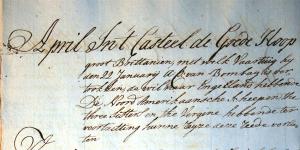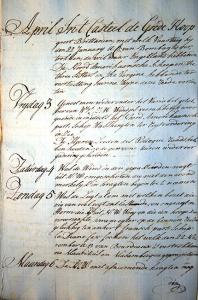A project examining the Dutch East India Company’s day registers reveals unique information on the Cape’s past climate.
JOHANNESBURG , GAUTENG , SOUTH AFRICA , August 17, 2022 /EINPresswire.com/ -- In a project that spanned seven years, the Tracing History Trust, with support from international collaborators, including those from Wits University and the University of Cardiff, has digitised and transcribed the Dutch East India Company’s (VOC’s) day registers, covering the years 1652 to 1791. This allows for unparalleled
insights into South Africa’s early modern history, and notably the past climate of Cape Town.In the release of their first paper (based on this transcribed material) in the prestigious Bulletin of the American Meteorological Society, authors Professor Stefan Grab in the School of Geography, Archaeology & Environmental Studies at Wits University, and Dr Mark Williams in the School of History, Archaeology and Religion at Cardiff University introduce the longest written daily weather record prior to the 19th century for the Southern Hemisphere. The paper, entitled “The late 18th-century climate of Cape Town, South Africa, based on the Dutch East India Company ‘Day Registers’ (1773-1791),” enabled the authors to reconstruct the historical climate of Cape Town in exquisite detail, informing the trajectory of climate change. Furthermore, there is elaborate information on how people were impacted by weather and climate during the 17th and 18th centuries.
“The day registers are an unprecedented record of South African history which spans many subjects such as daily weather conditions, economics, trade, and religion,” notes Grab. In particular, the daily weather record is the most comprehensive of data, with no other forms of weather records (gleaned from organic matter for example) able to reveal such detailed information.
Grab and Williams’s first article homes in on the period of transcriptions dated 1773-1791.
“This is a decent few years to have a glimpse of Cape Town’s weather. What we see is that there were, on average, more rain days between 1773 and 1791 than any time since then. The records also reinforce what scientists know about increasing temperatures over recent centuries,” says Grab. He believes the data are invaluable in revealing more about how both natural factors (such as volcanic eruptions and solar energy) and human-driven activities have impacted weather and climate. “Back then the weather wouldn’t have been impacted as much by humans. We see that global warming has increased since the industrial revolution, and our research adds detail on how local weather and climate have changed in response to such warming,” he says.
In addition, the data reveal that weather and economic systems across geographies were interconnected. For instance, major volcanic eruptions affected the weather and climate in the Cape. And if there were monsoons in the Indian Ocean, or frozen conditions in the Atlantic Ocean, then trade was affected too. “Obviously these detailed weather records were also a way for the colonial empires to have control over the movement of ships and thus the colonies as a whole,” adds Williams.
The significance of ‘quotidian’, everyday data to inform the historical narrative
The quotidian data present in the day registers allows for a deeper analysis of the everyday lives of people in the Cape, and also the machinations of the colonial system. “Often, what is included in the canons of “history” are major political events and other flashpoints, but through the lens of the every day, over time we can see broader trends that have major environmental and social implications,” says Williams.
“There are two parts of this story that have global significance,” says Grab. “The publication of our article coincides with the completion of the transcription of the day registers, covering almost 140 years (these have been transferred to The Hague [Nationaal Archief] and will soon be available online). There are hundreds of thousands of words transcribed, not only about the climate, but about trade and social life in the Cape. This is significant for a time period in a particular location where so little has been recorded and studied.”
In a broader sense, these day registers are imperative to conserving national and international memory, and highlight the importance of digitising and transcribing records for future generations.



No comments:
Post a Comment